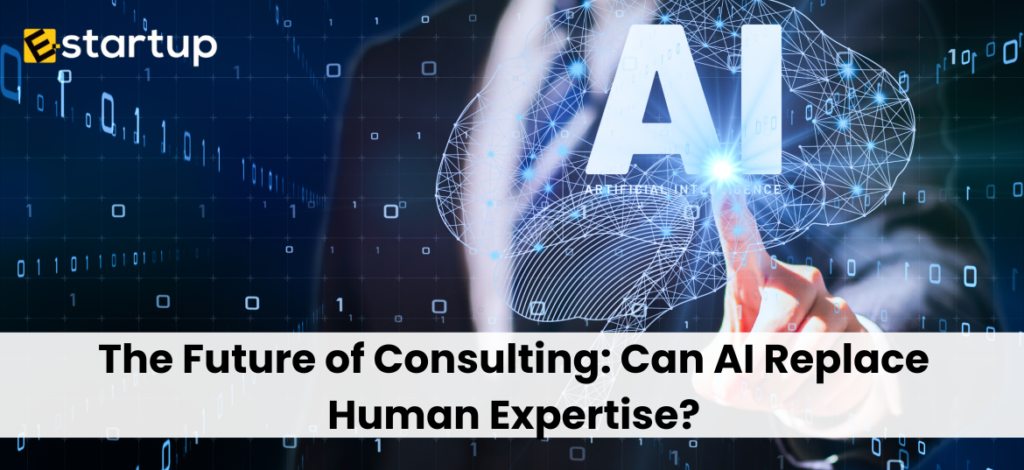Introduction
Artificial Intelligence is no longer a buzzword, it’s changing the way we live and work.
One such area where AI is bringing in a huge change is consulting. And that takes us to a question:
- Can AI replace human consultants?
- Will technology render expert advisors obsolete?
The response is more detailed. AI is changing consulting, but not by making humans replaceable. Instead, it’s becoming a partner that does the work and data crunching, consultants to do strategy, creativity, and relationship building.
What AI Brings to Consulting
AI is really good at things that involve speed, data, and repetition. It enables consultants to operate more efficiently and provide insights that were previously time-consuming to generate.
Quick Data Analysis
AI is able to scan huge sets of data, market trends, customer opinion, and competitor behavior in seconds.
Smarter Insights
AI doesn’t simply analyze data, but finds underlying patterns and correlations that might go unnoticed by humans. Consultants can then offer sharper, fact-supported recommendations to clients.
Automated Reporting
AI applications can draft initial reports, financial models, or presentation outlines. Consultants can then sharpen the documents rather than creating them from scratch, saving time and minimizing errors.
Routine Task Management
From setting meetings to coordinating project information, AI streamlines day-to-day consulting work, allowing consultants to concentrate on more valuable activities.
Personalized Recommendations
With machine learning, AI is able to customize solutions to a client’s particular needs, providing more focused strategies and improved results.
Even with these strengths, AI has its limitations. It is unable to think creatively, be sensitive to intricate human dynamics, or develop trust. These are still human consultant domains.
Why Human Consultants Are Still Important
Strategic Judgment
Consultants have context and thought at the big-picture level. They realize cultural nuances, industry differences, and ambiguities that no algorithm can ever grasp.
Creative Problem-Solving
Statistics show you what is going on. But imagination suggests what to do about it. Consultants create creative solutions that AI alone cannot dream up.
Emotional Intelligence
Effective consulting depends upon trust, empathy, and rapport with customers. Consultants interpret body language, empathize with feelings, and develop strong relationships skills that AI cannot match.
Ethics and Values
Humans make sure strategies are aligned with organizational values, social responsibility, and ethical standards. AI does not possess moral judgment.
AI as a Partner, Not a Replacement
UAE’s Daring Move: The First AI Cabinet Advisor
The United Arab Emirates (UAE) provides a real-world look at what this alliance entails.
In January 2026, the UAE will officially appoint the world’s first AI Cabinet Advisor.
Main features of this initiative:
Non-voting role: AI won’t displace ministers. It will instead examine data and propose evidence-based suggestions.
Government-wide use: The AI will also guide the Ministerial Development Council and federal boards.
AI in lawmaking: AI will assist in refreshing and enhancing legislation through the new Regulatory Intelligence Office, increasing efficiency by as much as 70%.
Ethical safeguards: Uncompromising regulations guarantee that the AI operates transparently and responsibly.
This indicates how AI will assist leaders with vision and foresight, while humans are still the last decision-makers.
New AI-Driven Consulting Models
Consulting firms themselves are changing, testing out AI-first models.
Some companies already employ AI to offer affordable insights for small businesses that couldn’t formerly finance traditional consulting.
But even in these models:
- Humans check AI results.
- Consultants tailor recommendations to each client’s context.
- The “human touch” remains fundamental to client trust.
AI will reduce the cost and increase access to consulting, but it will not eliminate the necessity of human consultants.
How Consultants and Companies Can Get Ready
For consultants, the message is simple: Welcome AI, don’t be afraid of it.
Here’s how to get ready:
Master AI Tools
Learn how to apply AI to research, analysis, forecasting, and reporting. These tools will automate routine work freeing up time for higher-order work.
Sharpen Human Skills
Emphasize creativity, problem-solving, empathy, and ethics domains where humans are best and AI can’t match.
Be Curious and Informed
AI is changing rapidly. Consultants who remain informed about emerging tools and trends will remain competitive.
For companies looking for consulting, the future will be about collaborating with hybrid teams where AI delivers speed and data, and humans deliver judgment and leadership.
Conclusion
AI is undoubtedly revolutionizing consulting making it quicker, wiser, and more efficient. But consulting’s essential strengths judgment, creativity, empathy, and ethics are still human.
The UAE’s choice of having the first AI Cabinet Advisor is evidence of this balanced future: AI as a decision-making partner, not a substitute for human wisdom.
Consultants who adopt AI will add more value and become indispensable. Those that don’t risk getting left behind. Consulting’s future isn’t one of human or artificial intelligence it’s one of combining the best of both.
REFERENCES
- https://u.ae/en/about-the-uae/digital-uae/uae-strategy-for-artificial-intelligence
- https://www.weforum.org/reports/the-future-of-jobs-report-2023
FAQs
- Will AI completely replace human consultants in the future?
No. AI will assist consultants by handling data-heavy and repetitive tasks, but human expertise in strategy, creativity, and relationship-building will remain irreplaceable. - What kind of tasks can AI handle in consulting?
AI can analyze data, generate reports, detect trends, automate scheduling, and provide personalized recommendations faster and more accurately than humans. - Why are human consultants still important if AI is so advanced?
Consultants bring emotional intelligence, ethical judgment, cultural awareness, and creative problem-solving — qualities that AI lacks. - What is the UAE’s AI Cabinet Advisor initiative?
The UAE appointed the world’s first AI Cabinet Advisor (2026), a non-voting role designed to provide data-driven insights, improve legislation, and support ministers in decision-making. - How will AI impact the cost of consulting services?
AI will lower the cost of consulting by automating repetitive tasks, making consulting more affordable and accessible for startups and small businesses. - Can AI improve consulting accuracy?
Yes. By identifying hidden patterns and correlations in large datasets, AI enables consultants to make more evidence-based and precise recommendations. - What are the risks of over-relying on AI in consulting?
Risks include lack of creativity, ethical blind spots, misinterpretation of cultural nuances, and an absence of emotional intelligence. - How should consultants prepare for the rise of AI?
They should master AI tools, sharpen human skills (empathy, creativity, judgment), and stay updated on AI trends to stay competitive. - Will AI make consulting jobs obsolete?
No. Instead of eliminating jobs, AI will transform them — consultants will shift from repetitive tasks to high-value work such as strategy and leadership. - What does the future of consulting look like?
The future lies in hybrid models where AI delivers speed and insights, while humans provide judgment, trust, and ethics. Together, they will shape smarter and more balanced decision-making.













